Amit Shah now enters an unfamiliar and interesting phase of his political career.
His success or failure will henceforth be assessed based on his performance as a key minister, points out Shekhar Gupta.
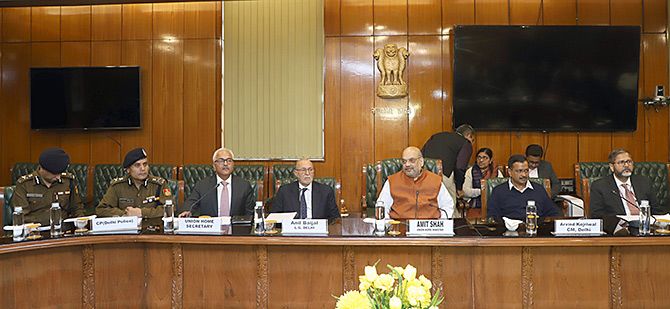
Notice how Shah's chair is higher than the chairs of the others at the meeting! Photograph: Press Information Bureau
What do we make of the Narendra Damodardas Modi-Amit Anilchandra Shah BJP government, now that the latter has finally moved away from his control of the party?
He had done so a few weeks earlier, formally handing charge to his successor Jagat Prakash Nadda, but the Delhi election was still the pending item on his agenda.
How does the road ahead look?
This, the Modi-Shah government, is the third such in our 73-year independent history yet -- governments led by the power of two.
A pair of leaders with comparable stature working closely together.
Of course, there are others which had just one leader, or short-lived ones which had none at all.
For those of us watching politics from the sidelines, all three types are fun.
The leaderless arrangements, from Charan Singh to I K Gujral, through V P Singh, Chandra Shekhar and H D Deve Gowda, are the most entertaining because they fight, leak, and die quickly.
Those with one leader, like Indira Gandhi and Rajiv Gandhi, compensate you with stories of intrigue, mostly set around who is in and who is out.
But those where power is shared between two near-equals aren't boring, either.
Our first such arrangement, of Pandit Jawaharlal Nehru and Sardar Vallabhbhai Patel, was so fascinating that it is still making headlines almost 75 years later.
You could argue that it was a sharing of power in mutual trust between Sonia Gandhi and Manmohan Singh.
But the difference is, there the prime minister wasn't even the first among equals.
In fact, towards the second half of that arrangement, he wasn't even the second.
He was the third, after Rahul Gandhi.
That leaves us with the two BJP/National Democratic Alliance governments under Atal Bihari Vajpayee and Narendra Damodardas Modi, respectively.
Both have been run by that power of two, the first Vajpayee and Lal Kishenchand Advani and the second now, with Modi and Shah.
There are differences, however. Vajpayee and Advani were close personal friends and kindred souls, also fellow long-marchers and about the same age.
They were always seen as equals, one more popular, acceptable and softer, the other harder, more political, ideological.
They disagreed often, but deferred to each other.
I had sometimes compared them with an old couple, deeply loyal, dependent and affectionate mutually, but squabbling often and lapsing into periods of long, sullen, sulks.
Modi and Shah are in a different category altogether.
Nehru and Patel were near-equals with many disagreements that were known publicly.
But there was never a doubt who the boss in that arrangement was.
How their tensions would have played out in the long run we will never know because Patel died within three years of Independence.
Vajpayee and Mr Advani had a different equation.
There is zero doubt that Advani founded and built the new BJP, created a new Hindutva space, and positioned it firmly there. He built and controlled the party.
Within the BJP, he was also a mass leader and deal-maker, building and breaking alliances.
Vajpayee was more a public performer and romantic.
For most of his politics, he followed Advani even if he sometimes fretted about his methods, or withdrew into hurt and embarrassment, as after the Babri Masjid demolition.
But he would never defy or overrule Advani.
At the same time, when the party came close to power, Advani faced his moment of truth with pragmatism.
He knew it would be impossible to knit a coalition of diverse ideologies with the thin thread of anti-Congressism under his leadership.
He needed someone more inclusive and acceptable, namely Vajpayee.
It follows that Vajpayee did become prime minister, but the real power in the party remained with Advani, as it did in many ways within the government.
We saw early evidence of this as Vajpayee wasn't allowed to induct his trusted and much-valued friend and aide Jaswant Singh in his Cabinet and the continuing squabbles within, as circles close to the RSS (and surely not far from Advani) kept harassing him over his alter ego Brajesh Mishra or foster son-in-law Ranjan Bhattacharya.
Then, most importantly, Advani prevailed when Vajpayee wanted to sack Modi in the wake of the 2002 Gujarat riots.
Even on strategic issues, whether India was going to make war or peace, Advani had the final word.
It's a documented fact that even the Agra summit with General Pervez Musharraf was an idea moved forward by Advani, as was the decision to scuttle it.
In the usual sycophantic and gossipy circle around them, the buzz was, arre bhai, they are always together, like Ram and Lakshman.
Until Advani got impatient waiting.
He had quite a durbar of his own.
It was people around him who egged him on. A few dramatic things happened then. Rumours from 'informed' circles spread in Vajpayee's last year that he was tired, and might be retiring -- and handing over to the successor-apparent.
This made Vajpayee break his silence. He asserted famously, with a touch of irony more than humour, that he was 'neither tired, nor retired'.
This became more complicated as Advani, again encouraged by his party's heartland sweep (Rajasthan, Madhya Pradesh, Chhattisgarh) in the winter of 2003, forced a reluctant Vajpayee to advance the general election in 2004.
Midway through the campaign, stories about Vajpayee being tired and old surfaced again, suggesting he would abdicate midway through his next term and hand over to Advani.
Vajpayee was furious, and made no secret of it.
After the NDA lost that election against the run of play, he let people know whose 'greed and sin' had brought them to their deserved fate.
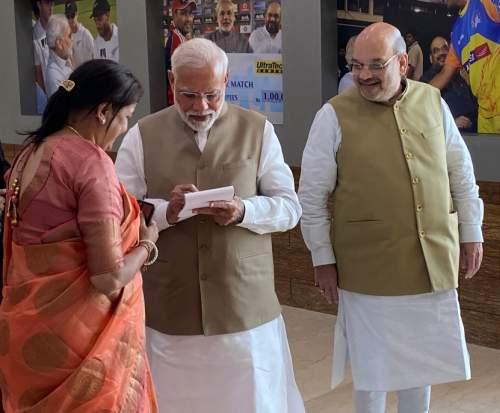
The Modi-Shah arrangement is strikingly different in many ways.
Let's count three most important ones.
First, while they are fellow travellers for about two decades, one is an all-conquering mass leader and the other a brilliant party commissar.
There is a clear role, and skill-set distinction.
One brings the votes and the other gets the party and its electoral machine in place to collect these.
To that extent, it is truly a number one and two relationship.
A bit like a corporate chief executive officer and chief operating officer, a chief minister and his most trusted chief secretary, commandant and sergeant-major or, if you prefer it that way, although Mr Shah said he didn't want that comparison, Chandragupta Maurya and Kautilya.
Second, the two have a radically different outlook in public life.
One, an extroverted public performer, enjoying global adulation and attention, the other a back-room power player unwilling to give an audience to even ambassadors of key countries.
One, a crowd-puller, the other a rouser of only the party faithful.
One, careful to play the good cop often, the other equally content to go with his beliefs, even if it means being the bad cop always.
And third, in this case unlike the other two, the number two is considerably (14 years) younger than the other.
Therefore, he looks at a political future way beyond the number one.
This Delhi election completes Mr Shah's innings as the party boss.
He might have preferred it ending differently.
But, from Haryana to Delhi through Jharkhand, and to some extent Maharashtra, voters have underlined a tough fact to him: That the vote for Mr Modi is not the same as a vote for the BJP and definitely not for the most polarising aspects of its ideology.
It is with this sobering realisation that Mr Shah now enters an unfamiliar and interesting phase of his political career.
His success or failure will henceforth be assessed based on his performance as a key minister.
With Mr Modi, he now forms the most powerful and fascinating pair in our political history yet.
And much political writing in years to come will be defined by their equation, and as time passes, more by the Shah story.
By special arrangement with The Print

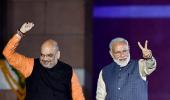
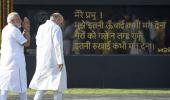

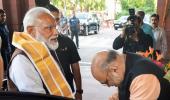
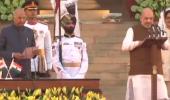



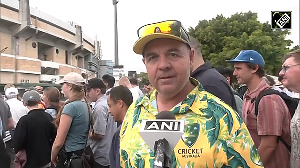
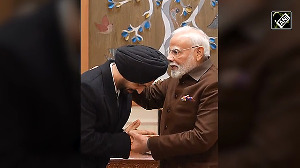

 © 2025 Rediff.com -
© 2025 Rediff.com -